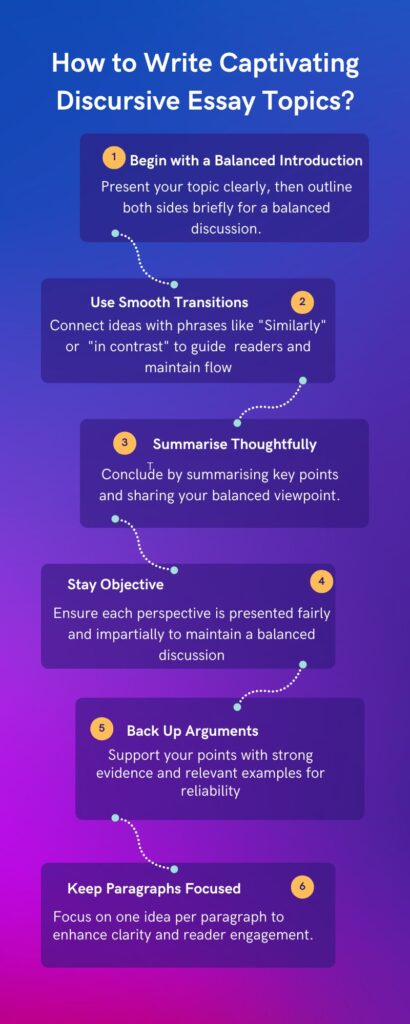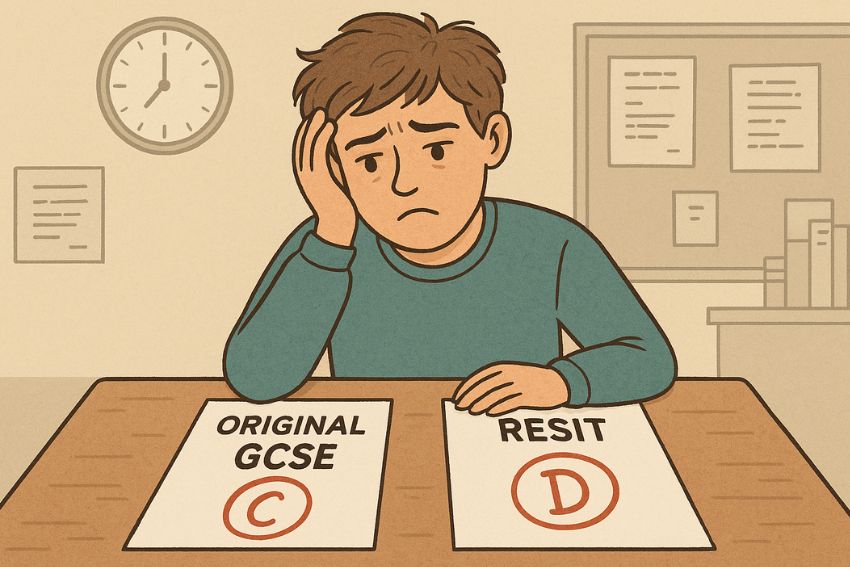Proven Discursive Essay Topics to Captivate Readers: Elevate Your Writing
What are discursive essay topics, and why are they important? Discursive essays allow students to explore multiple perspectives on a topic, encouraging critical thinking and balanced arguments. Unlike persuasive essay topics, which aim to convince the reader of a single viewpoint, discursive writing presents both sides of an issue objectively.
This type of essay challenges readers and writers to consider different perspectives, fostering better understanding and analytical skills. By mastering discursive writing, students can develop the ability to communicate ideas clearly while addressing opposing arguments with fairness and respect.

What is Discursive Writing? Higher English and Beyond
So, what is discursive writing? At its core, discursive writing is about exploring a topic from multiple perspectives in a balanced and objective way. Unlike essays that argue for a single viewpoint, discursive essays focus on presenting both sides of an issue fairly, allowing readers to form their own conclusions.
Generally, discursive essays are commonly taught in higher English, where students are encouraged to analyse argumentative topics thoughtfully. These essays typically start with an introduction outlining the topic, followed by body paragraphs presenting contrasting views, and conclude with a balanced summary. This structured approach helps writers navigate complex issues while fostering critical thinking and respectful debate.
Therefore, by mastering discursive writing, students in higher English and beyond can develop essential skills for discussing argumentative topics and expressing ideas with clarity and confidence.
What are the Types of Discursive Essay Topics?
When selecting a topic, consider these types of discursive essay topics:
- Open-ended topics: Focus on presenting balanced arguments without a definitive conclusion (e.g., “Is online education better than traditional classrooms?”).
- Controversial topics: Encourage debates by tackling divisive issues (e.g., “Should euthanasia be legalised?”).
- Factual topics: Based on evidence and research, ideal for analysing trends or policies (e.g., “Is remote working the future of employment?”).
By choosing from these discursive essay topics, you can explore engaging ideas while honing your analytical and critical thinking skills. Whether you’re writing for high school or higher English, these topics provide a strong foundation for a balanced discussion.
How to Pick the Best Discursive Essay Topics
In fact, choosing the right discursive essay topic is an important step in creating a compelling and thoughtful essay. To keep your readers engaged, focus on good discursive essay topics that spark curiosity and allow for multiple perspectives.
Firstly, start by looking for controversial topics that naturally encourage debate. These topics often have strong arguments on both sides, making them perfect for a balanced discussion. For example, “Should social media platforms be regulated?” or “Is climate change activism effective?”
It’s also essential to choose a topic with enough depth. A good topic should offer plenty of information and viewpoints to explore. Avoid topics that are too narrow or straightforward, as these may limit your ability to provide a balanced argument.
Here are some examples of debate topics and good discursive essay topics to consider:
- Technology: “Does artificial intelligence pose a threat to jobs?”
- Education: “Should exams be replaced with continuous assessment?”
- Ethics: “Is animal testing ever justified?”
- Society: “Should the voting age be lowered to 16?”
By selecting engaging and relevant discursive essay topics, you’ll not only enjoy writing the essay but also capture your readers’ interest.
Examples of Discursive Essay Topics for Every Level
So, choosing an engaging discursive essay topic is essential to spark interest and allow for thoughtful analysis. Below, you’ll find a detailed list of argumentative topics, including ideas for higher English discursive essay topics and discursive essay topics for high school students. Grouped into popular categories to make selection easier.
| Education | Environment | Technology | Society and Culture | Health and Lifestyle |
| Is homework beneficial or harmful? | Should governments ban single-use plastics? | Is internet access a basic human right? | Should the voting age be lowered to 16? | Should governments regulate fast food advertising to children? |
| Should school uniforms be mandatory? | Is climate change activism effective? | Should AI replace teachers in the future? | Is cancel culture damaging free speech? | Is veganism the future of sustainable living? |
| Do exams truly measure a student’s ability? | Can renewable energy completely replace fossil fuels? | Does social media do more harm than good? | Does globalisation harm cultural traditions? | Should healthcare be free for everyone? |
Discursive vs Persuasive: Choosing the Right Essay Style
When comparing discursive essays and persuasive essay topics, the key difference lies in their purpose and approach. Discursive writing focuses on presenting multiple perspectives objectively, while persuasive essays aim to convince the reader of a single viewpoint using emotional appeal and evidence.
Discursive Writing vs Persuasive Writing: A Key Distinction
In discursive essays, writers explore argumentative topics by presenting balanced arguments. For example, a topic like “Should social media platforms be regulated?” would involve discussing both the pros and cons to let readers form their own conclusions. The tone remains impartial, encouraging critical analysis.
In contrast, persuasive essays advocate for one specific viewpoint. Using the same topic, a persuasive essay would argue exclusively for stricter regulations on social media, employing convincing evidence to persuade the audience.
Obviously, both essay styles have their own purpose. Discursive essays suit discussions on controversial topics like “Should the voting age be lowered to 16?” while persuasive essays are ideal for advocacy, such as “Why governments must act now on climate change.”
Consequently, by understanding these differences, students can approach discursive writing or persuasive writing with clarity, depending on their essay goals.

Tips for Writing a Discursive Essay
Crafting a discursive essay can be an engaging process. Here are some practical steps to guide you:

Thus, by following these steps, you’ll be well-equipped to write a compelling and balanced discursive essay.
What Are The Advantages of Discursive Writing?
As a matter of fact, writing discursive essays offers several benefits that can enhance your academic and professional skills. Let’s explore how engaging in discursive writing can be advantageous for you.
Enhances Analytical Thinking
So, when you write discursive essays, you examine various perspectives on a topic. This process sharpens your analytical thinking, as you assess different arguments and evidence. Correspondingly, by considering multiple viewpoints, you develop a deeper understanding of complex issues.
Improves Research Skills
Discursive writing requires thorough research to present balanced arguments. As you gather information from diverse sources, you enhance your ability to find, evaluate, and synthesise data. These research skills are valuable across various academic disciplines and professional fields.
Encourages Open-Mindedness
Exploring opposing views in discursive essays fosters open-mindedness. You learn to appreciate different perspectives, which can lead to more respectful and informed discussions. This skill is particularly useful in debates and collaborative environments.
Prepares for Debates and Professional Communication
In reality, discursive writing mirrors the structure of formal debates, where multiple sides of an issue are considered. By practising this form of writing, you prepare yourself for engaging in debates and professional communications. Consequently, you become adept at presenting balanced arguments, anticipating counterarguments, and articulating your thoughts clearly.
Conclusion
As discussed above, choosing the right discursive essay topics is crucial for developing your writing skills. Engaging with these topics enhances your analytical thinking and research abilities. Discursive writing encourages you to consider different perspectives, fostering open-mindedness and prepares you for debates and effective communication.
To begin your writing journey, explore the discursive essay topics we’ve provided. These topics are suitable for higher English discursive essays and will help you practise balanced argumentation.
Additionally, online English language tutors can be invaluable. They offer personalised guidance, helping you improve your discursive writing skills. With their support, you can gain confidence in crafting well-structured essays.
Thus, by selecting compelling topics and seeking assistance from online tutors, you’ll be well-equipped to excel in discursive writing. Embrace the opportunity to express your ideas and engage in thoughtful discussions.
FAQs
What is discursive writing?
Discursive writing is a style that explores various perspectives on a particular topic. Unlike persuasive writing, which aims to convince the reader of a specific viewpoint, discursive writing presents a balanced analysis, allowing readers to consider different sides of an issue. This approach fosters critical thinking and encourages readers to form their own informed opinions.
What are some common features of discursive writing?
Discursive writing is characterised by:
- Balanced Analysis: Discussing multiple perspectives on a topic.
- Formal Tone: Maintaining an objective and impersonal style.
- Evidence-Based Arguments: Supporting points with relevant data and examples.
- Logical Structure: Organising content coherently with clear transitions.
How to choose impressive Higher English discursive essay topics?
Selecting a compelling topic involves several steps:
- Interest: Choose a subject that genuinely intrigues you. Your enthusiasm will reflect in your writing.
- Relevance: Ensure the topic is pertinent to current societal discussions or debates.
- Balance: Opt for topics that offer multiple perspectives, allowing for a balanced discussion.
- Research Availability: Confirm that there is sufficient information available to support both sides of the argument.
For instance, exploring themes like the impact of social media on communication or the ethics of artificial intelligence can be great material for discussion.
What is an example of a discursive essay topic?
An example of a discursive essay topic is: “Should the voting age be lowered to 16?” This topic invites examination of arguments both in favor and against lowering the voting age, providing a platform for balanced discussion. Other examples include debates on the legalization of euthanasia or the impact of technology on education.
How is a discursive essay structured?
A discursive essay typically follows a structured format to present balanced arguments:
- Introduction: Introduce the topic and outline the main points to be discussed.
- Body Paragraphs: Present arguments for and against the topic, each in separate paragraphs, supported by evidence.
- Conclusion: Summarise the key points and state your own perspective, ensuring a balanced view.








